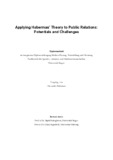Citation link:
https://nbn-resolving.org/urn:nbn:de:hbz:467-5175Files in This Item:
| File | Description | Size | Format | |
|---|---|---|---|---|
| buhmann.pdf | 1.24 MB | Adobe PDF |  View/Open |
| Dokument Type: | Master Thesis | metadata.dc.title: | Applying Habermas' theory to public relations : potentials and challenges | Authors: | Buhmann, Alexander | Institute: | Fachbereich 3, Sprach-, Literatur- und Medienwissenschaften | Free keywords: | Public Relations, Habermas / Theory of Communicative Action, Habermas / Structural Transformation of the Public Sphere | Dewey Decimal Classification: | 100 Philosophie | GHBS-Clases: | JGUR | Issue Date: | 2010 | Publish Date: | 2011 | Abstract: | Theoretical meta-analyses play an important role in the recent establishment of public relations research. It is vital to the 'discipline' to conduct critical as-is-analyses of existing theoretical efforts, elaborate the central lines of discussion and analyze the specific potentials and challenges of different theoretical applications. The work presented here aims to make a modest contribution to this current effort. Its focus lies in various attempts to fructify Habermasian concepts for the field of public relations research, which have received only scant attention and, on the whole, have not been subject to a comprehensive analysis so far. This work shows in how far the Theory of Communicative Action as well as the Structural Transformation of the Public Sphere may serve as a basis for theoretical and empirical endeavors in the field of public relations. In so doing, we present possible applications clustered in different analytical perspectives and discuss their individual and general challenges, contradictions and limitations. In confronting the presented applications with Habermas' critical understanding of public relations, we show that particularly the meso-level applications prove to be in conflict with their theoretical and philosophical underpinnings. Furthermore we subject two core aspects of the previous discussion, namely Habermas' program of moral justification and his differentiation of lifeworld and system, to some further considerations. Here we show how the increasingly popular focus on the natural environment in public relations ethics, as well as development of lifeworld-based networks into strategic organizations, may cause significant challenges for applications of Habermas' theory in the field of public relations research. |
URN: | urn:nbn:de:hbz:467-5175 | URI: | https://dspace.ub.uni-siegen.de/handle/ubsi/517 | License: | https://dspace.ub.uni-siegen.de/static/license.txt |
| Appears in Collections: | Hochschulschriften |
This item is protected by original copyright |
Page view(s)
703
checked on Apr 4, 2025
Download(s)
809
checked on Apr 4, 2025
Google ScholarTM
Check
Items in DSpace are protected by copyright, with all rights reserved, unless otherwise indicated.

